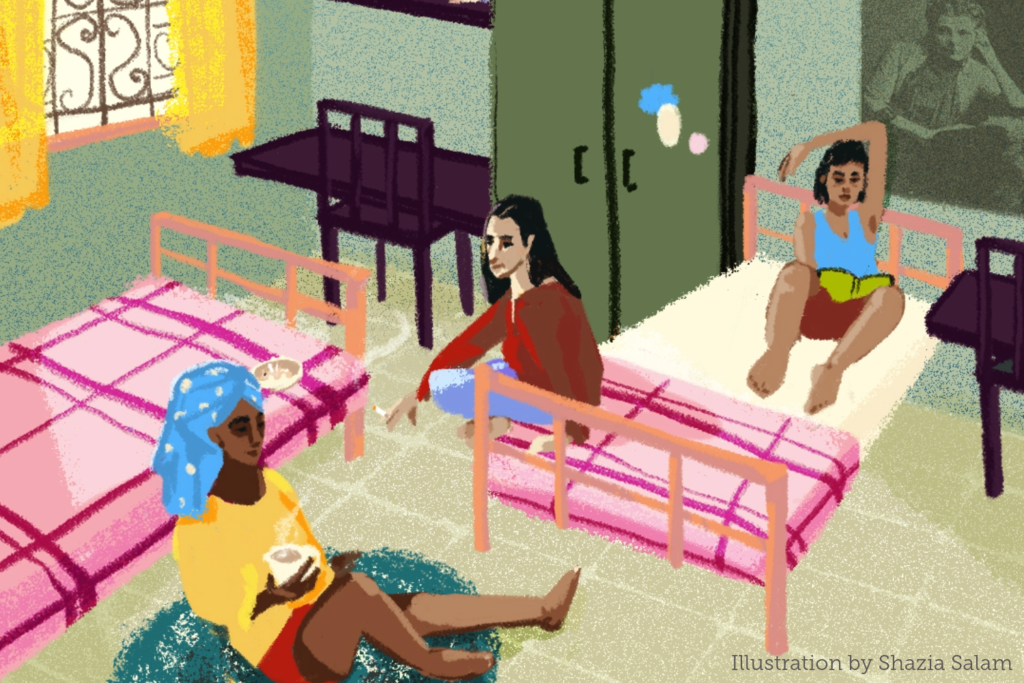The more I live the more I am convinced that what makes our friendships different from those of men, is how much we listen to each other. All of us—in that hostel space—we so meticulously narrativized everything. In talking to each other we assumed the pen of the author in a way we hadn’t before.
We were claiming agency, and we were telling our stories. Sometimes in interruptions. Mostly in vignettes we shared with each other, sitting on the hostel swing, sitting in the hostel lawn. It was not an orchestrated conversation that life makes you familiar with, the one you learn to have. These were relationships of spontaneity, with as little ceremony that a human life can possibly vouch for.
Friendship meant a negotiation that you had made in this world, beyond your blood relations. We all understood the weight of this relationship, which for the first time in our lives, we were realizing was a choice we made. We all acknowledged that there was work to be done here. Love took work. When you became friends with someone, you were already signing up for so much you were going to have to put in. So many sleepless nights, so many things you would have to do even when you did not want to.
And well, I do not know if it was our naive bachelor selves, but we genuinely believed all 58 batches of women who had inhabited the hostel before us had done the same.
******
IP College for Women, founded in 1924, was the brainchild of men who happened to be followers of the Irish reformer, Annie Besant.
But what should these girls learn?
In 1904 Besant wrote a pamphlet, titled ‘Education of Indian Girls’, followed by a school she set up in Benares, for the upper caste Hindu girls of the city. ‘The lines of western female education are not suitable for the education of eastern girls’, she proclaimed.
The first batch of women was introduced to a curriculum premised in four—the literary, the religious, the art and the scientific. The nationalist impulse was clear. One must study, but remember girls, never become Memsahibs.
I wonder if Ms Besant’s ghost shudders as she watches us in college, as we debate the farce that is her ‘suitable’ Indian woman, and pledge to never become one. As we critique the exclusivity of that which she very carefully instituted. I wonder if she watches us go back to our almost invisible kitchen in the hostel. I wonder if she thinks we should have one. Maybe she agrees with the matron as she asks me to put on a bra before I enter the mess.
I always thought that the hostel architecture had something to do with why everybody seemed to know each other. Our hostel was a small, old building. You entered and saw a long hallway extending into a linear row of rooms on one side, and a staircase on the other. The other end of the hallway extended into another row of rooms, interrupted by a big mess in the middle. The ground floor was marked by three lawns, and the first floor was marked by three terrace gardens.
The three seaters on the first floor were allotted to the first years. Our hostel had only fans, and the ground floor was relatively cooler. Hopefully, the first years became better adjusted as their second year approached and they were shifted to the hotter rooms on the first floor.
As I walk from A-26 to C-6 I see Parboni didi’s beanbag, I see Nikita didi throw t-shirts into an open suitcase, I see Tina and Arushi sitting on their bed watching a movie. All of their rooms lined one after the other. All of their doors open. Some I say hi to, some I just watch as I pass. But I notice everyone.
*
In Ismat Chughtai’s Tedhi Lakeer, there is a moment when our protagonist, Shaman, is living in the hostel and wants to be better friends with another girl, Najma, who sadly is more interested in Saadat than she is in Shaman. However, another girl, Rasul, is very attracted to Shaman. Shaman is not pleased. She ‘hates Rasul Priya with a passion’, and does not want anything to do with her.
I do not know how or why, but it is indeed the truth. All Shamans must love a Najma, and be repulsed by a Rasul. But only because the Rasuls scare us, not because we hate them. We seem to always locate an ideal beauty in one woman, and try to strive to achieve that ideal, to become the Najmas. And although Shaman never does, I wonder if it is in striving to become Najma that we learn how to love the Rasuls too.
Why I bring up Terhi Lakeer is because it seemed to ask me to pay attention to how much the women Shaman meets were the windows to that which she needed to see. This was never an easy negotiation for Shaman—some days it was generous, some days it was cruel. And yet, in the absence of the men, in Rooms of their Own, these women operated in expectations instituted by them, entirely on their own. Irrespective of whether they were behavioral constraints that were sometimes binding and oppressive, they disrupted heteronormativity nevertheless. They allowed these women to explore sexuality, desire, emotions in ways that were not permissible in the world outside.
And that, I feel, is the crux of why female spaces are eulogized the way they are by people that live in them. It’s not a situation of zero conflict. But it is a space, that is, for most part governed by the spirit instituted by the women that live in them. They rupture the heteronormative. We repeat the vow to each other every day. Not at the altar, but in A-17, in A-26, and in B-36, for three consecutive years. In Sickness, and In Health.


